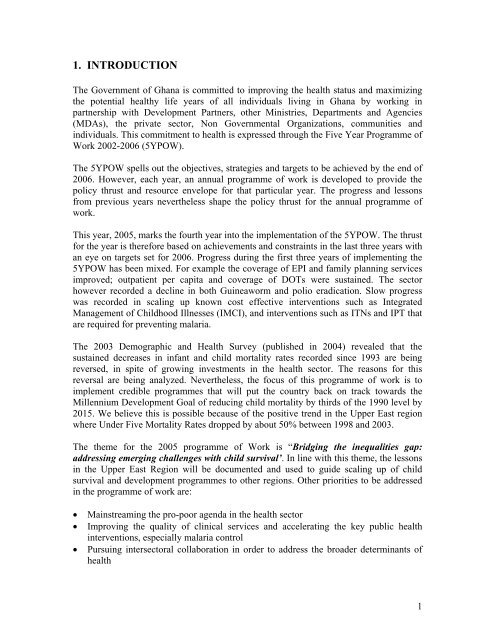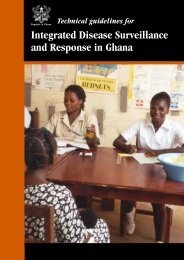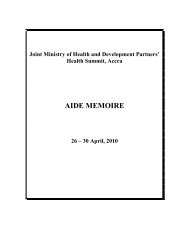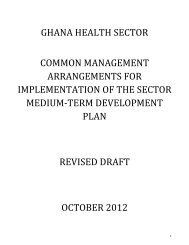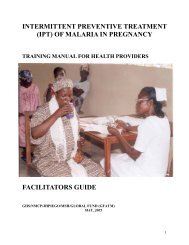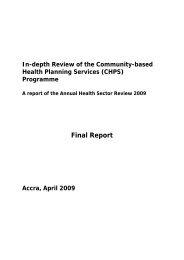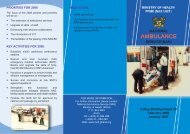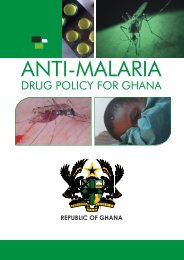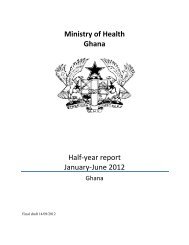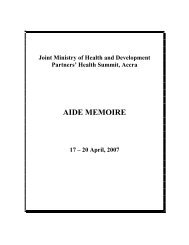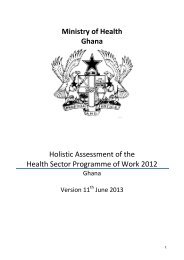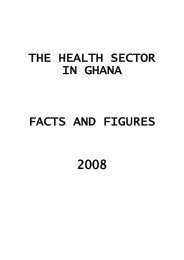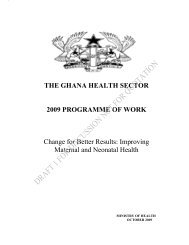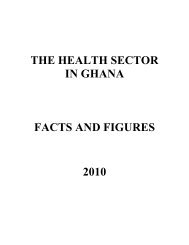Annual Programme of Work 2005 - Ministry of Health
Annual Programme of Work 2005 - Ministry of Health
Annual Programme of Work 2005 - Ministry of Health
Create successful ePaper yourself
Turn your PDF publications into a flip-book with our unique Google optimized e-Paper software.
1. INTRODUCTION<br />
The Government <strong>of</strong> Ghana is committed to improving the health status and maximizing<br />
the potential healthy life years <strong>of</strong> all individuals living in Ghana by working in<br />
partnership with Development Partners, other Ministries, Departments and Agencies<br />
(MDAs), the private sector, Non Governmental Organizations, communities and<br />
individuals. This commitment to health is expressed through the Five Year <strong>Programme</strong> <strong>of</strong><br />
<strong>Work</strong> 2002-2006 (5YPOW).<br />
The 5YPOW spells out the objectives, strategies and targets to be achieved by the end <strong>of</strong><br />
2006. However, each year, an annual programme <strong>of</strong> work is developed to provide the<br />
policy thrust and resource envelope for that particular year. The progress and lessons<br />
from previous years nevertheless shape the policy thrust for the annual programme <strong>of</strong><br />
work.<br />
This year, <strong>2005</strong>, marks the fourth year into the implementation <strong>of</strong> the 5YPOW. The thrust<br />
for the year is therefore based on achievements and constraints in the last three years with<br />
an eye on targets set for 2006. Progress during the first three years <strong>of</strong> implementing the<br />
5YPOW has been mixed. For example the coverage <strong>of</strong> EPI and family planning services<br />
improved; outpatient per capita and coverage <strong>of</strong> DOTs were sustained. The sector<br />
however recorded a decline in both Guineaworm and polio eradication. Slow progress<br />
was recorded in scaling up known cost effective interventions such as Integrated<br />
Management <strong>of</strong> Childhood Illnesses (IMCI), and interventions such as ITNs and IPT that<br />
are required for preventing malaria.<br />
The 2003 Demographic and <strong>Health</strong> Survey (published in 2004) revealed that the<br />
sustained decreases in infant and child mortality rates recorded since 1993 are being<br />
reversed, in spite <strong>of</strong> growing investments in the health sector. The reasons for this<br />
reversal are being analyzed. Nevertheless, the focus <strong>of</strong> this programme <strong>of</strong> work is to<br />
implement credible programmes that will put the country back on track towards the<br />
Millennium Development Goal <strong>of</strong> reducing child mortality by thirds <strong>of</strong> the 1990 level by<br />
2015. We believe this is possible because <strong>of</strong> the positive trend in the Upper East region<br />
where Under Five Mortality Rates dropped by about 50% between 1998 and 2003.<br />
The theme for the <strong>2005</strong> programme <strong>of</strong> <strong>Work</strong> is “Bridging the inequalities gap:<br />
addressing emerging challenges with child survival’. In line with this theme, the lessons<br />
in the Upper East Region will be documented and used to guide scaling up <strong>of</strong> child<br />
survival and development programmes to other regions. Other priorities to be addressed<br />
in the programme <strong>of</strong> work are:<br />
• Mainstreaming the pro-poor agenda in the health sector<br />
• Improving the quality <strong>of</strong> clinical services and accelerating the key public health<br />
interventions, especially malaria control<br />
• Pursuing intersectoral collaboration in order to address the broader determinants <strong>of</strong><br />
health<br />
1


